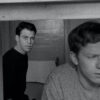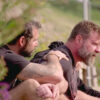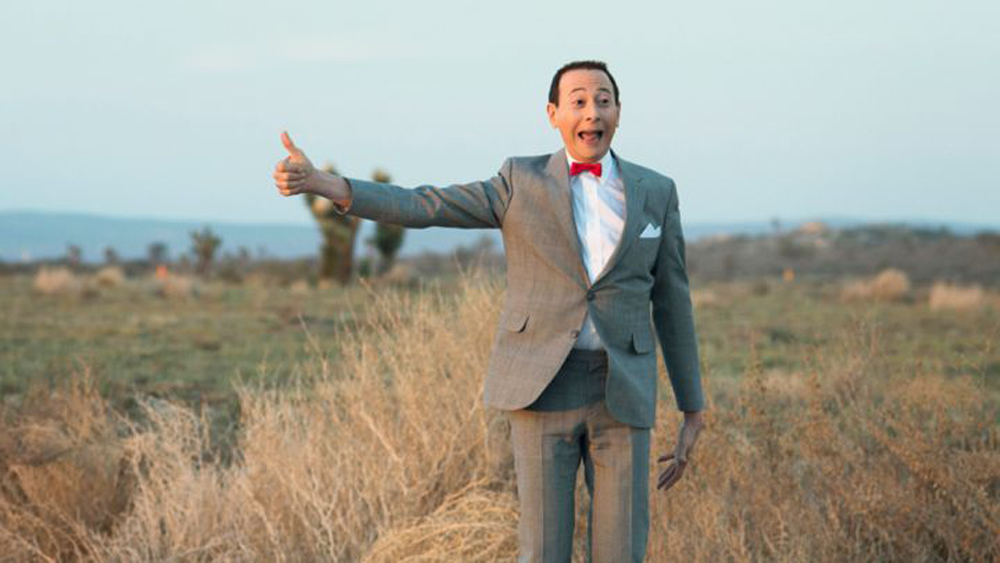John Lee was happy he could finally make something he could take his children to see.
“It’s like my kids can’t see ‘Wonder Showzen’ or ‘Xavier’ or ‘The Heart, She Holler’ or certainly not ‘Broad City,’ but if some day they will see all those things, I hope they get it,” says Lee, the absurdist madman director and Adult Swim mainstay, before a giant grin starts to creep across his face as a subsequent thought enters his head. “Or I hope they show me something stranger.”
If Lee is to get his wish, it may be traced back to the night he showed them his feature directorial debut at SXSW, “Pee-wee’s Big Holiday,” which would be poetic since he can count Paul Reubens iconoclastic comic creation as an influence on his own work. The same is true of the film’s co-screenwriter Paul Rust, who thought he had been hallucinating when Judd Apatow, who had taken notice of Rust through a script he had written with his Glass Beef musical partner-in-crime Charlene Yi, floated the idea of engineering a big-screen comeback for Pee-wee after a celebrated stage revival in 2010. Yet what the two did together in collaboration with Reubens and Apatow on “Pee-wee’s Big Holiday” honors the plucky bow-tied hero by being original in its own right, sending Pee-wee on a cross-country adventure involving snake farms, the Amish, frisky farmer’s daughters and a girl gang of bank robbers after a new best friend (a winning Joe Manganiello) suggests there’s more to the world than his humble hometown of Fairville.
Propelled with a childlike glee, albeit dabbling in the subversion that Lee and Rust are known for in their after hours comedy shows, the film ideally allows new fans in while being well worth the wait for those pining for a new Pee-wee movie since 1988’s “Big Top Pee-wee,” and a day after “Pee-wee’s Big Holiday” enjoyed its world premiere at the SXSW Film Festival in front of a packed house at the Paramount Theater in Austin, only hours before it was made available globally for streaming on Netflix, where it can be watched right now, the director and writer spoke about bringing back the beloved character, the surreal experience of stepping into Pee-wee’s world and making a film that they could call their own. (Note: These interviews were conducted separately, but edited together later.)

John Lee: I always thought of my job as making Paul’s movie better. This is a Pee-wee Herman comeback and that’s a big responsibility creatively. Like whatever he would make, I was there to just go, “Let’s push it a little this way or let’s push that.” He’s so open and good about collaboration — he knows a better idea when he hears it — so it was great. We just got along so much in that realm of mutual respect and I didn’t want to make it my own movie, I just wanted to make his movie as good as it could be.
It was also my goal to defend and differentiate [this] from the other movies, so [I thought], “I can do what those other movies or the show didn’t do, which is make it emotional.” I think it was successful in the fact that people actually get sad [at times], and it’s hard to make a comedy do that. That’s the thing no one talks about, but I’m the most proud of. You can hear the audience go from laughing to getting upset and back again in 10 seconds and I’m really proud of that.
Paul Rust: Yeah, I think the reason it worked as a fit [for me as a writer] was because Pee-wee was so much in my DNA that anything I was doing probably was influenced by Pee-wee. Neil Campbell and I, when we first moved to LA, were doing sketch comedy and we met Scott Aukerman, who was a really big fan of our sketches. I remember thinking, “Well, me and Neil are just ripping off ‘Mr. Show,’” a show that Scott wrote on, so of course he’s going to like it because we’re ripping off the thing he worked on!” And it was the same way with Paul. With Pee-wee, the shared thing was that my taste in comedy went more towards the sweet and non-cynical. I don’t really like mean-spirited comedy. Getting to write with Paul, who as Pee-wee is the ultimate version of that type of comedy — it’s all-inclusive, it’s not hateful —it was like a nice, warm pool to dip into.
What was your first point of connection with Pee-wee?
John Lee: I probably have a connection a little bit before you do — to the HBO Special and I probably started to fade on [“Playhouse”] because I was starting to go college and getting older and you just starting getting into weirder things, but certainly, I’m a member of the fan club. I’ve told everyone else except Paul. I have the little autograph photo, I’ve got my membership card still somewhere. I was a big Pee Wee fan and I have close friends who are like, “Wow, you’ve been spending your whole life preparing to make this movie.” I was very excited when you get the job, it’s knuckles.
Paul Rust: Growing up, I think Pee-wee was the first thing that I saw that made me truly laugh on a level that I had never laughed before. I remember my mom rented “Pee-wee’s Big Adventure,” and it made me want to figure out how to ride a bike. That’s how instrumental it was. We taped a version of it off TV so that was the copy I grew up with, but we taped it during a free weekend of HBO [when they would] get people to subscribe, so they’d run the phone numbers at the bottom. Then it became “Pee-wee’s Playhouse” and I saw “Big Top Pee-wee” in the theater. I wore a Pee-wee University sweatshirt and when I got into high school and college, I grew to appreciate it on another level, which was just like, “Oh! It’s ‘Pee-wee’s Big Adventure’ and ‘Pee-wee’s Playhouse!'” they’re like mini-masterpieces.

Paul Rust: It was exciting that, despite Pee-wee existing in different TV shows and movies, there was nothing cannon, where we [thought], “Well, you can’t do that because you did this and there’s all these rules that you have to follow!” We had the freedom of, “Hey, if it’s funny, we’re going to do it!” That was probably the best part getting to work in this universe.
John Lee: It was very much like “Wonder Showzen” is most of the time. You have your office and people come to you and talk to you about stuff and as a director, I’m always like, “I want to go to the art department” because it’s so much more fun to go look at [everything]. Pee Wee’s bedroom [for instance], it’s a big task. It’s only in the movie for 10 seconds, but you have to make all these decisions, so because of the story, we went with a storybook idea. [Pee-wee] never left [his hometown of Fairville], so he lived in a little, quaint storybook town and we [thought], “Okay, let’s fill it with animals that don’t leave. They stay and hibernate,” so it’s got all these squirrels and chipmunks and little bears to set up his never leaving. Then it’s full of Fairville stuff.
You walk into the art room with our production designer Dan Butts and they have hundreds of little squirrels and when you get to touch them and feel them, you’re like, “If I were this person, I would like these 14 right here.” Then you do that with Paul [Reubens] and he’s like, “Yeah. What about that weaver one?” There’s so much joy just to go see them construct and paint that stuff and Paul is so meticulous about art direction because it’s so part of who he is just as an artist. And people expect that of the Pee-wee world, so there are a lot of decisions in the movie both big and small that we just jam packed everything we could into. In a way I [thought], “That’s what a movie should be, especially a Pee-wee movie.”
In general, what was it like shooting that opening sequence?
John Lee: We probably spent the most time shooting that because there are so much stuff. The challenge was figuring out how do we get Pee-wee to do it? He’s older, but if he’s not driving that little red car, what’s the point? When he comes down that thing, that’s what you want to see. The challenge was always to figure out how do we get him to be able to do it without doing a lot of visual effects, mostly in-camera effects like wire-work. We had a couple of stunt people, but only [Paul Reubens] walks and talks like Pee-wee, so it’s got to be Pee-wee. It’s hard to copy it.
The film hits all the satisfying beats of a traditional narrative, but takes an interesting route to get there. Did the fact that both of you were working on your first feature – with the guidance of Paul Reubens, obviously – contribute to the fact that maybe you didn’t have preconceived ideas about how the film should be structured?
John Lee: No, it’s a road movie, which is such a freeing narrative, so you just basically go from set-piece to set-piece. Clearly, it’s hard to not to compare it to the other road movie [“Pee-wee’s Big Adventure”], but what can you do? That’s just going to exist just like the criticism of nostalgia is going to exist, but it’s been 30 years, so we can all get past that and just judge the movie for what it is. I was just happy that all those little set pieces feel self-contained. For the three of us, it was just making sure that each one had its point and would either lead to the next one or they’d be self-contained movies. For instance, the Farmer Brown one, you can literally start the movie with [Pee-wee] approaching the barn, then escaping the church [at the end], and you’d be like, “Oh, that was a short little Pee-wee Herman movie.” [The challenge was] making sure that those variations existed as much as possible and to take advantage of those options.
Paul Rust: I wrote a feature script with Charlyne Yi for Judd [Apatow] years ago and I remember when he read the script, he’s like, “The thing that I really like about the script is it’s so obviously the movie you guys have been waiting for because there’s so many ideas in there that you can tell have been dying to come out.” I think that was the same thing with the Pee-wee movie — there’s stuff in there that feels like, “Oh! Somebody’s been wanting to do this gag their whole life and they’re finally getting to.” Maybe that’s what people can feel in the movie and amazingly, Paul, even though he’s been doing this character for years, is still able to retain that joy and innocence of doing something for the first time. I think that really comes across in his performance, and his writing, and the whole world of Pee-wee.

John Lee: It was the test of patience, for sure, but we shot that and the editor showed me his first cut and he’s like, “I just want to say, I did one scene that I know you did coverage for, but I held on one take.” Then he told what it was and within five seconds, I knew exactly he was right because the only people who’ve done that — where you just hold on a performance — is in Jerry Lewis movies a long time ago. That’s what Paul is, he’s this odd throwback to another time, so it was just about being classic. Tim Orr, the [cinematographer], and I were always talking about, “How do we shoot this the most classic way possible?” I didn’t want my camera to intrude or to impose myself onto this movie. I just want to capture the experience in the simplest way.” All the angles are very classic, though there’s a few things snuck in here and there that are a little more modern.
Was there a particularly surreal day on this for you?
John Lee: The strangest day was the dream sequence [with Joe Manganiello] because we had all these live fireworks, we were shooting on a camera that shoots super slow-motion like a 1,000 frames per second and we had a giant cake that only lasted for a couple of hours and we were in this black box. All that was surreal. People were just like, “What the hell’s going on? What is this?” There were a lot of questions about it and we set up this truck that moves, so you get six seconds [of footage] – six seconds in slow motion is like two minutes. So we’d do this, and [crew would] be like, “What?” Then the first time that we showed playback to everybody and they saw Pee-wee jumping in super slow-motion with Joe, everyone was like, “Oh my God, this is amazing.” It all clicked, but that was probably the strangest [moment] like, “Is this going to work?” Then you see it and it was like, “We’ve got to spend the whole night doing this because this is so fun.” It was challenging to come up with such a unique dream sequence, so that was part of it.
Paul, did you get to choose your cameo in the film as Ernie, the pancake-loving denizen of Fairville?
Paul Rust: [laughs] No, that was just Paul, John, and Judd doing me a nice little favor and letting me appear in the movie. I got to play Ernie in the diner, which was awesome because a lot of Paul’s characters in the Pee-wee world end in “e,” like “Pee-wee,” or “Chairry,” or “Conky.” [But it was surreal because] we would write often at Paul’s house and sometimes I would notice there would be a hanger with the Pee-wee suit on it and I was like, “Oh my gosh! It’s existing there in the world!” So when I came to set and he was dressed as Pee-wee, it was like, “Oh, finally! I get to see this come alive!” It was so cool. And because it’s a road movie, every two days you’re going into a new world or [have] a new character, so there’s the fun of “Oh, we’re not filming an eighth day in the same location.” You’re just jumping everywhere, which was very exciting.

John Lee: Luckily, I’ve always just trusted myself as far as comedy and what I think is good. [With] the television work I’ve done, which is basically [with] Vernon Chatman and Alyson Levy, just the three of us, Vernon and I are the writers/directors, then Alison is our person that we go like “yeah?” Then she goes “Yeah.” We get very few notes otherwise, so I’ve really had a ton of freedom that way and I’ve just learned to know what to think is funny. This movie is pretty swift, and I think that a movie’s got to be at the pace of comedy. People were laughing over lines [at the screening] and people were like, “It’s too bad they didn’t hear that line,” and I’m thinking that’s so much better because that’s just what comedy is. I’ve always been like, “No, that’s great because now they want to see it again.”
Also, I’ve been in bands and your live performance is different than recording, so I’m always thinking about tightness and swiftness. I’m happy this movie’s basically 90 minutes. because for me, that’s what a comedy should be. So I just trusted myself and Paul, and [our editor] Jeff Buchanan, and [when] we would just all talk about [scenes], sometimes we’d go, “Well, let’s add that quarter second back because it actually helps the timing of the joke.” It’s your job in the edit to find that rhythm of comedy.
What was the premiere like for you?
Paul Rust: It was so much fun because the whole theater was just filled with Pee-wee fans, so I felt like I was with my people. Also, it was very affirming to hear people laugh and feel there was just so much love in the room. After the screening, when we were on stage, so many people were just yelling out, “We love you, Pee-wee!” It was really one of the best nights I’ve ever had. It was a lot of fun.
John Lee: In Pee-wee terms, it’s like the little boy who could fly, like you really got your dream. My family was there, not just my children, but my mother and sister who knew me as a Pee-wee fan, and it seemed very odd because there were all these connections that I made to it that I didn’t understand until last night — I grew up in a tiny town in California and now I live in New York City, so I made the same journey that Pee-wee has made. Just hearing people laugh at the things that I thought it was funny about Pee-wee, I was really happy about it because who knows if I’m correct or not. I have my own [thoughts] about what I think is great about them, so it was really fun to see it on the big screen with the crowd whose just loving Pee-wee in this elevated form. What’s not to love about that?
“Pee-wee’s Big Holiday” is now available on Netflix.




